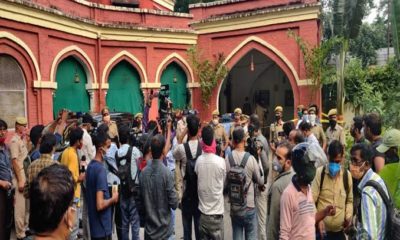World
US theatre shooter sentenced to life in prison

Washington: James Holmes, who shot dead 12 people at a movie theatre in Colorado three years ago, has been awarded life imprisonment with no parole.
Holmes was on Friday spared the death penalty for killing a dozen people and wounding 70 more inside a packed midnight showing of a Batman film. He was found guilty of 164 counts of murder and attempted murder, as per reported.
The jury announced the decision after hearings by 306 witnesses, including first responders, family members of the victims, and even the parents of the mass murderer.
A total of 2,695 pieces of evidence were presented to the jury during the trial which took place over the past three months.
Families and friends of the victims sobbed in dismay, as the jury surprised the experts by giving the neuroscience graduate student life in prison instead of the death penalty as many predicted.
Holmes’ mother wept quietly when the decision was read out.
Several family members of the victims were angry upon hearing the verdict.
Judge Carlos Samour Jr. said: “We the jury do not have a unanimous, final sentencing verdict on this count and we the jury understand that as a result the court will impose a sentence of life imprisonment without the possibility of parole.”
On July 20, 2012, Holmes, brandishing three weapons and dressed from head-to-toe in body armour, walked through the exit door of the Century 16 Theatre, which was showing the midnight premiere of “The Dark Knight Rises” and pumped hundreds of bullets into the unsuspecting audience.
World
Lockdowns in China Force Urban Communities to Defy Censorship and Vent Frustration Online

Shanghai’s rich middle class is leading a wave of online dissent over the strict and prolonged lockdowns imposed in various parts of the country. Chinese internet censorship is struggling as patience is wearing thin in many urban centers, coming up with creative forms of online protests.
Social Media Posts Revealing Lockdown Tension in Shanghai
Drawn-out lockdowns are nothing new in China as authorities insist with the nation’s zero-Covid policy since the start of the pandemic. Currently over This time around, however, metropolitan areas like Shanghai are increasingly difficult to keep quiet, given that its more than 25 million residents have seen weeks of total isolation along with food shortages and many other service interruptions.
Dozens of towns and reportedly over 300 million Chinese citizens have been affected by lockdowns of different severity. As expected, urban netizens have been most outspoken over their difficulties by finding creative ways to get around state censorship and bans placed on topics, news comments and spontaneous campaigns.
Shanghai residents have been using mobile proxies and hijacking seemingly unrelated hashtags to talk about healthcare issues, delivery failures and the overall severity of their situation. The “positive energy” that the Chinese government wants to transmit during the recent prolonged series of lockdowns does not come naturally to those counting food supplies and online censors are working hard to filter words, trending topics and undesired social media sharing.
WeChat groups and message threads are under constant monitoring. Posts questioning the zero-Covid approach have been quickly deleted, including by leading Chinese health experts like Dr. Zhong Nanshan. Video footage is soon censored and protests and investigations are quickly made to disappear.
Where this has not worked, officials have exposed banners with warnings and outright threats like “watch your own mouth or face punishment”, while drones have been patrolling the city skies. Yet, if anything, this has led to further tensions and unspoken confrontation with Shanghai’s educated and affluent middle class.
Creative Online Solutions Harnessing Civic Energy
Announcements by Chinese social media that they would be publishing the IP addresses of users who “spread rumors” have not helped either. Tech industry research has shown that much of Asia’s tech-savvy population has a habit of using mobile proxies and other privacy tools, quickly finding workarounds to browse the internet freely and talk to the world about the hottest topics.
The sheer volume of forbidden posts is already a challenge for the very censorship system, experts explain. Unable to track all trending hashtags, state workers overlook topics that speak about the US, Ukraine or other popular news. Linking human rights elsewhere to their situation, Chinese online dissidents establish their informal channels and “hijack” the conversation to share personal or publicly relevant information about the Covid suppression in their town.
Sarcastic and satirical posts still dominate. Others hope to evade the censors by replacing words from famous poems or the national anthem. One thing is certain – social media, when harnessed with the right creativity, has proven its ability to mount pressure on the government in even some of the most strictly controlled tech environments like China.























